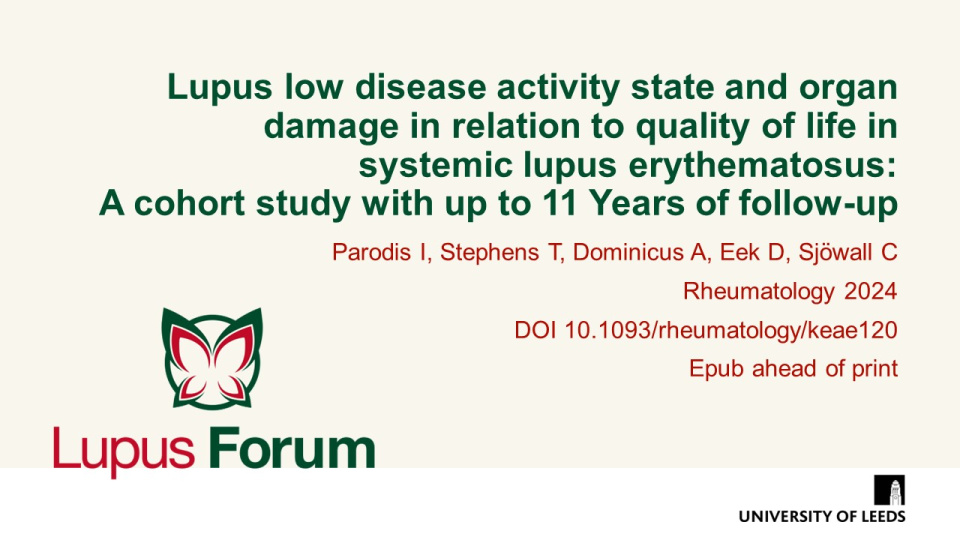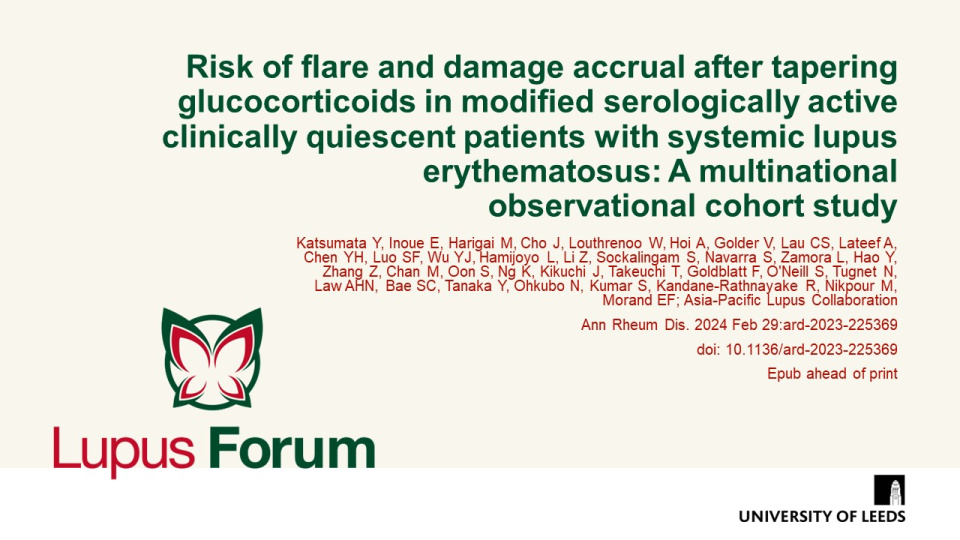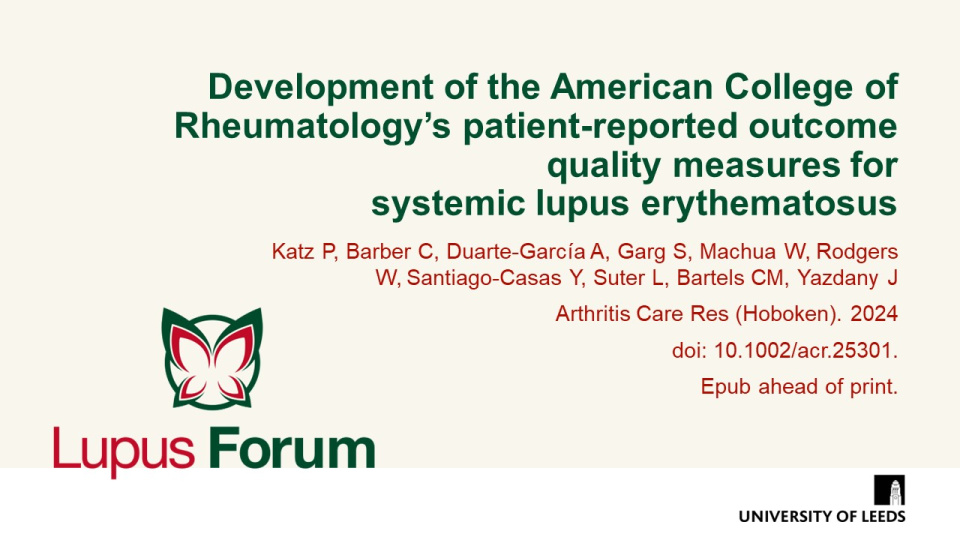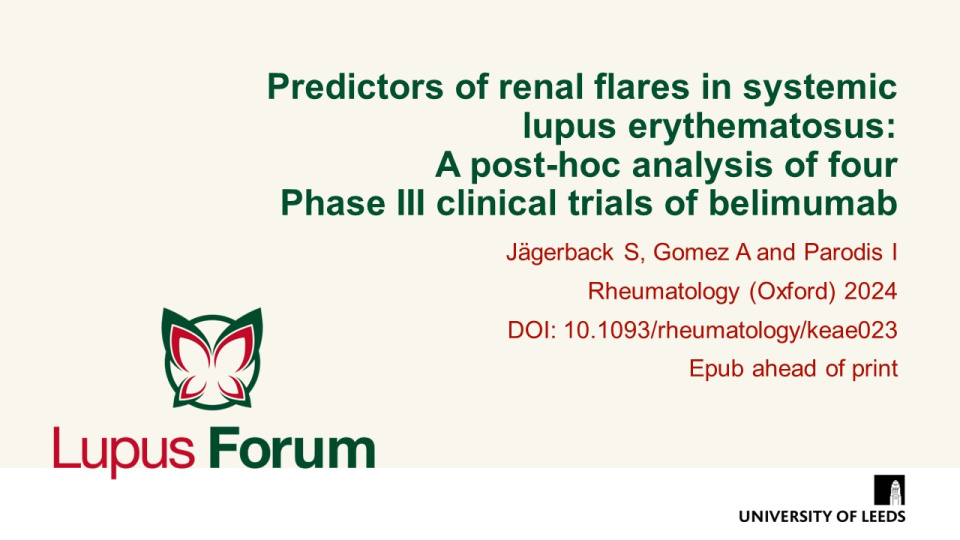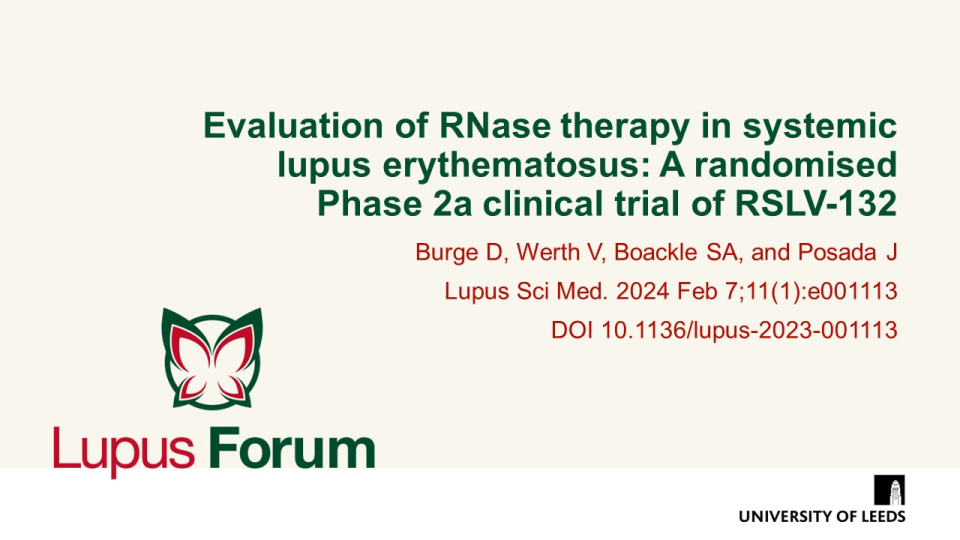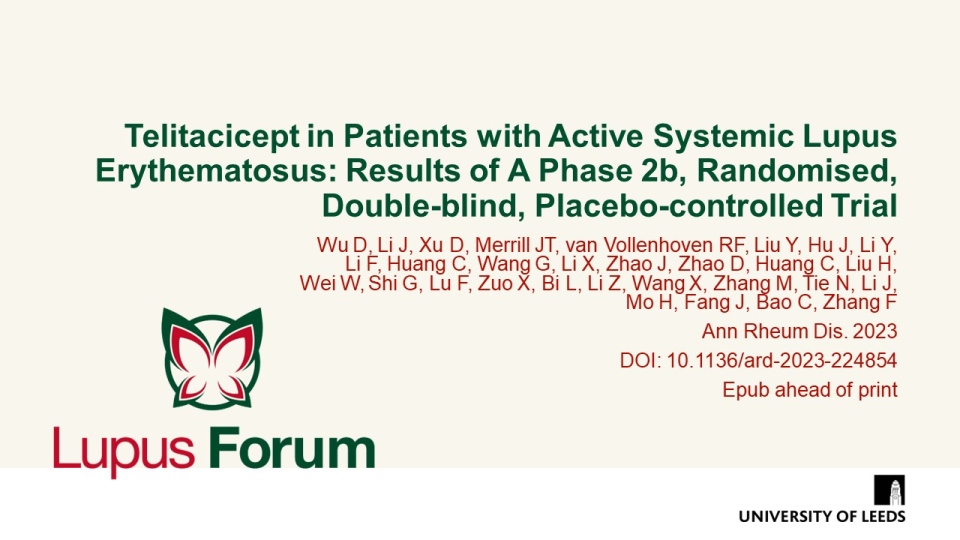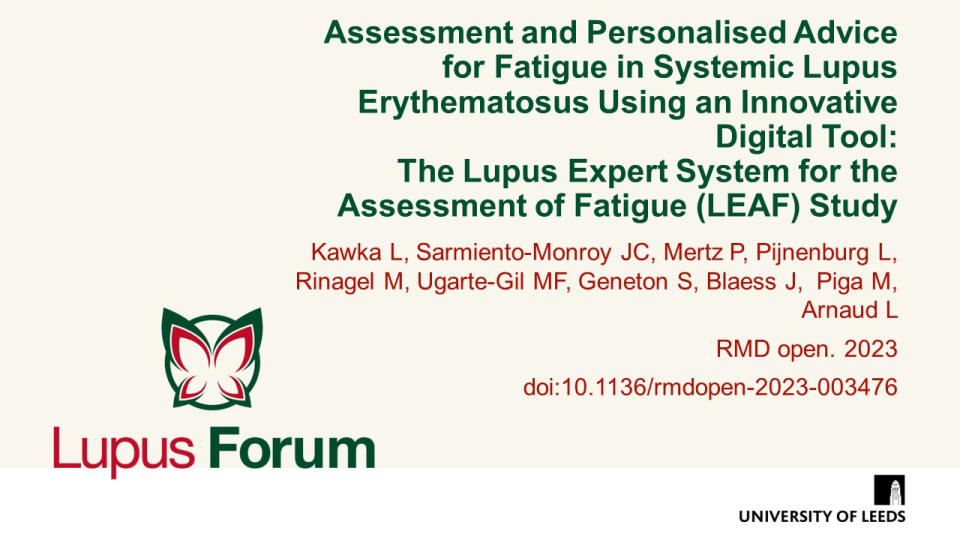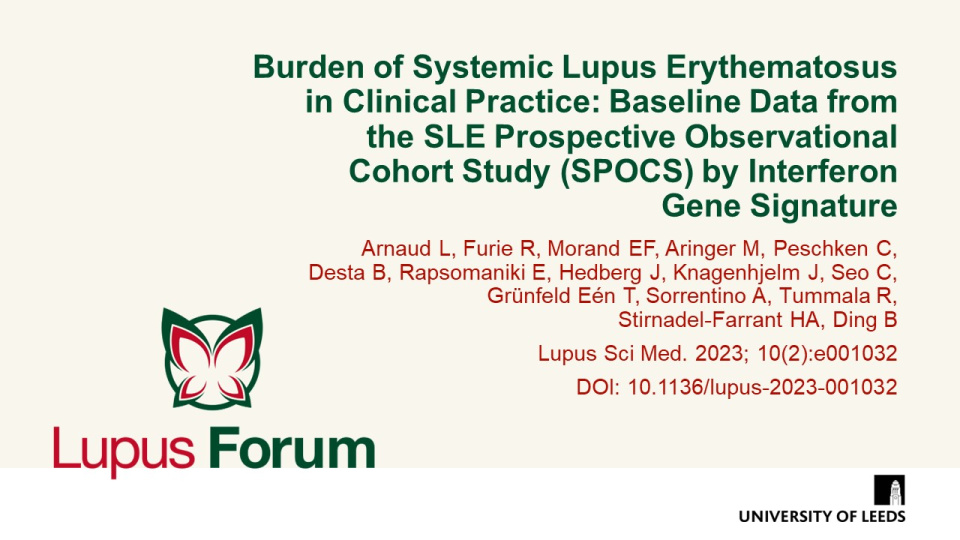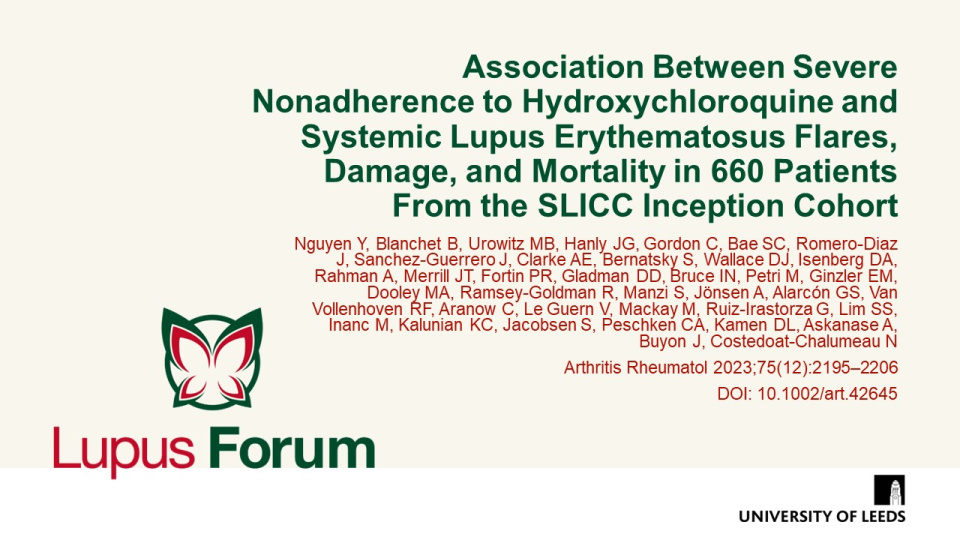Publications
Find coverage of the latest original articles on Lupus, focusing on those with data on therapeutic interventions and those that have clinical impact.
This activity is supported by an educational grant from AstraZeneca.
Lupus low disease activity state and organ damage in relation to quality of life in systemic lupus erythematosus: A cohort study with up to 11 years of follow-up
Rheumatology 2024 DOI 10.1093/rheumatology/keae120 Epub ahead of print
Patients with a lupus low disease activity state (LLDAS) irrespective of organ damage were significantly more likely to have favourable health-related quality of life, pain, fatigue, and overall health experience.
Keywords:
Risk of flare and damage accrual after tapering glucocorticoids in modified serologically active clinically quiescent patients with systemic lupus erythematosus: A multinational observational cohort study
Ann Rheum Dis. 2024 Feb 29:ard-2023-225369 doi: 10.1136/ard-2023-225369 Epub ahead of print
Flare risk did not increase following glucocorticoid tapering in modified serologically active clinically quiescent patients with SLE. They also found that antimalarial use was associated with decreased flare risk.
TYK2: An emerging therapeutic target in rheumatic disease
Nat Rev Rheumatol 2024 DOI 10.1038/s41584-024-01093-w Epub ahead of print
TYK2 inhibitors hold promise for the treatment of a distinct spectrum of autoimmune diseases, including SLE, and could potentially have a safety profile that differs from other JAK inhibitors.
Development of the American College of Rheumatology's Patient-reported Outcome Quality Measures for Systemic Lupus Erythematosus
Arthritis Care Res (Hoboken). 2024 doi: 10.1002/acr.25301. Epub ahead of print.
Expert workgroup members and patient partners recommend that clinicians assess depression and physical function at least once yearly in all people with SLE. Additional patient reported outcome measures addressing cognition and fatigue can also be assessed.
Predictors of Renal Flares in Systemic Lupus Erythematosus: A Post-hoc Analysis of Four Phase III Clinical Trials of Belimumab
Rheumatology (Oxford) 2024 DOI: 10.1093/rheumatology/keae023 Epub ahead of print
High baseline proteinuria levels, hypoalbuminaemia, and C3 consumption were associated with
renal flare development. Renal flares remain common in patients with SLE, however causative factors are still largely unknown. Jagerback, et al. conducted a post-hoc analysis of pooled BLISS trial data to identify predictors of renal flares.
Keywords:
Evaluation of RNase Therapy in Systemic Lupus Erythematosus: A Randomised Phase 2a Clinical Trial of RSLV-132
Lupus Sci Med. 2024;11:e001113 DOI 10.1136/lupus-2023-001113
Treatment with RSLV-132 was associated with lower rates of SAEs than placebo, although RSLV-132 therapy was not associated with a significant improvement in the mean CLASI score relative to placebo. However, results suggest that further evaluations of RSLV-132 in SLE should be undertaken with patients with more active disease who are most likely to benefit from RNase therapy.
Telitacicept in Patients with Active Systemic Lupus Erythematosus: Results of A Phase 2b, Randomised, Double-blind, Placebo-controlled Trial
Ann Rheum Dis. 2023; DOI: 10.1136/ard-2023-224854
This Phase 2 trial demonstrated the efficacy and acceptable safety profile of telitacicept in patients with SLE. The safety profile of telitacicept was comparable with that observed in clinical trials of other B cell-targeting agents.
Keywords:
Assessment and Personalised Advice for Fatigue in Systemic Lupus Erythematosus Using an Innovative Digital Tool: The Lupus Expert System for the Assessment of Fatigue (LEAF) Study
RMD open. 2023; DOI:10.1136/rmdopen-2023-003476
Kawka et al investigated the use of the LEAF digital health tool to successfully assess the extent of patient-reported fatigue in SLE patients.
Burden of Systemic Lupus Erythematosus in Clinical Practice: Baseline Data from the SLE Prospective Observational Cohort Study (SPOCS) by Interferon Gene Signature
Lupus Sci Med. 2023; 10(2):e001032 DOI: 10.1136/lupus-2023-001032
This study from Arnaud et al described baseline characteristics of SLE patients grouped by disease activity and IFNGS category in the international SPOCS study. IFNGS-high patients were younger at SLE diagnosis, and a baseline SLEDAI-2K score ≥10 was associated with shorter disease duration, more frequent and more severe flares. IFNGS-low patients were more likely to exhibit musculoskeletal and CNS comorbidities than IFNGS-high patients. Continuation of the SPOCS study will allow investigation into how different baseline characteristics affect long-term outcomes in SLE patients.
Keywords:
Association Between Severe Nonadherence to Hydroxychloroquine and Systemic Lupus Erythematosus Flares, Damage, and Mortality in 660 Patients From the SLICC Inception Cohort
Arthritis Rheumatol. 2023; 75(12):2195–2206 DOI: 10.1002/art.42645
n this study, severe nonadherence to hydroxychloroquine (HCQ) was independently associated with the risk of SLE flare in the following year, early damage and 5-year mortality.


